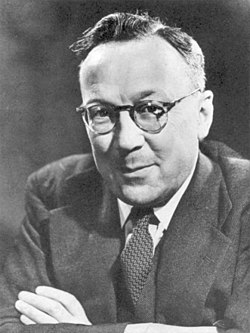Robert Watson-Watt
| Sir Robert Watson-Watt | |
|---|---|
 |
|
| Born | Robert Alexander Watson 13 April 1892 Brechin, Angus, Scotland, UK |
| Died | 5 December 1973 (aged 81) Inverness, Scotland, UK |
| Known for | Radar |
| Notable awards |
|
Sir Robert Alexander Watson-Watt, KCB, FRS, FRAeS (13 April 1892 – 5 December 1973) was a Scottish pioneer of radar technology. Radar was initially nameless and researched elsewhere but it was significantly developed in February 1935 when Watson-Watt demonstrated the first practical radio system for detecting aircraft when he successfully detected a radio wave from a BBC short-wave transmitter which had bounced off a Handley Page Heyford aircraft. Having proved radar detection technology could work and received a patent for his system, on 1 September 1936 Watson-Watt became Superintendent of a new establishment under the Air Ministry, Bawdsey Research Station near Felixstowe, Suffolk. Work there resulted in the design and installation of aircraft detection and tracking stations called Chain Home along the east and south coasts of England in time for the outbreak of the Second World War in 1939. This system provided the vital advance information that helped the Royal Air Force win the Battle of Britain.
After the success of his invention, Watson-Watt was sent to the US in 1941 to advise on air defence after Japan’s attack on Pearl Harbor. He was elected a Fellow of the Royal Society in 1941, was given a knighthood in 1942 and was awarded the US Medal for Merit in 1946.
Born in Brechin, Angus, Scotland, on 13 April 1892 Watson-Watt (the hyphenated name is used herein for consistency, although he did not adopt it until 1942) was a descendant of James Watt, the famous engineer and inventor of the practical steam engine. After attending Damacre Primary School and Brechin High School, he was accepted to University College, Dundee (then part of the University of St Andrews but became the University of Dundee in 1967). Watson-Watt had a successful time as a student, winning the Carnelley Prize for Chemistry and a class medal for Ordinary Natural Philosophy in 1910.
...
Wikipedia
